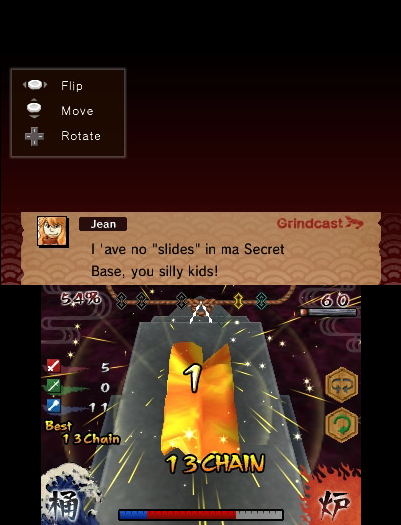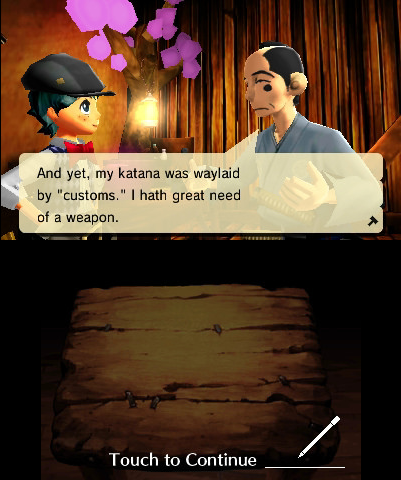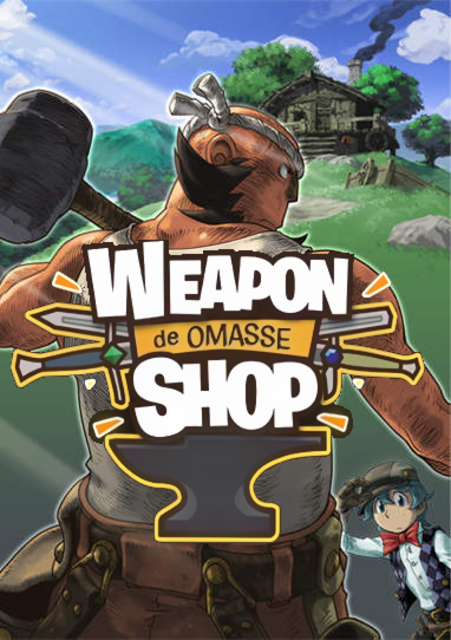Another Level-5 Guild game that, while charming, has a few gameplay issues that needed hammering out.

Weapon Shop de Omasse is the last of Level-5's Guild series to see a US/EU release, but the reason for its delay was not necessarily because it was most extensive or complex game. Rather, it's a game that relies heavily on traditional Japanese comedy (and thus had a lot of text to translate), as it was penned by the prominent Japanese comedian Yoshiyuki Hirai of the manzai duo America Zarigani. Level-5 began their Guild series as a means to showcase freelance Japanese video game designer talent, featuring the likes of Final Fantasy Tactics' Yasumi Matsuno, Mega Man's Keiji Inafune and Grasshopper's Goichi "Suda51" Suda. Level-5 also wanted to extend from a rogue's gallery of exceptional design talent to include game proposals from fields as diverse as Japanese stand-up comedy. Hence, we get what seems to be another rare example of a traditional Japanese RPG from the perspective of the store owners rather than the heroes: a concept that I believe originated with Torneko Taloon's chapter from Dragon Quest IV and is perhaps best known to the west via EasyGameStation/Carpe Fulgur's Recettear: An Item Shop's Tale. In actuality, it's really a framing device for a lot of in-jokes about JRPGs from a lifelong fan of the genre, with a few blacksmithing-related mini-games to buoy the gags.
In the land of Weapon Shop de Omasse, the master blacksmith Oyaji and his son and apprentice Yuhan operate the eponymous weapon store which has just pioneered a new rental service for weapons: the idea being that Oyaji and Yuhan can only create so many weapons between the two of them, so instead they rent out the few they are able to make. The customers can feel assured that the weapons they rent are of excellent quality, as their defeat would lead to the weapon's loss and a subsequent blow to the weapon store's livelihood. The store's diverse and unusual customers come to terms with the idea quickly enough, and the game settles into a rhythm of taking orders, crafting powerful weapons, renting them out to the customers and then watching their progress on the "Grindcast": a fake Twitter service for adventurers that relays their thoughts and reservations, as well as battle data, to everyone on the network. Grindcast updates continue to trickle in as the player is crafting or polishing weapons, allowing them to keep tabs on how their customers are doing.

The crafting and polishing mini-games, which comprise the entirety of the gameplay, are unfortunately a little too light to be engrossing for long. Polishing simply involves wiping the stylus up and down the weapon, flipping it over, and buffing the other side until a satisfactory level of gleam is reached. This has the benefit of slightly raising the weapon's stats after it has been freshly crafted, though the boost is larger if the weapon has been rented out and returned with some experience. Crafting is a little more layered, and can involve the addition of various modifying materials which can be bought or are given to the store as rewards for successful NPC quests. To craft a weapon well, the player has to follow a rhythm game of sorts that plays similarly to NanaOn-Sha's PaRappa the Rapper: the game demonstrates each chain of notes to hit to a rhythm, and the player must replicate them. Off-note hits gives the weapon a smaller strength boost, and missing entirely gives it zero boost. The weapon only needs so many hits with the blacksmith's hammer to be completed, so the goal is to conserve the number of strikes so they provide the maximum gain. The player must also be wary of the heat: a gauge at the bottom that goes from yellow to red to blue. Yellow indicates too high a heat, which might lead to denting. Likewise, blue heat is too low and won't shape the weapon as effectively. A finished weapon will receive bonuses to its three damage types (piercing, slashing and blunt; most weapons are designed for a specific damage type) as well as a critical hit chance (larger critical hit chances are earned if the player hits a long chain of notes without missing) and durability (which will be lowered for dents and insufficient/excessive heat). These all have an effect on the NPC's combat prowess when using the weapon and, along with random dice rolls, govern the likelihood of their success. Since this mode is a little more exact and specific, it takes a while to truly excel at it and thus is almost in-depth enough to carry the player through to the end of the game, at which point they will have made anywhere between fifty to a hundred weapons (the game has ninety-four unique weapon types that are gradually unlocked as Yuhan gets more proficient).
The real draw of the game, then, is the comedy. Generic NPCs with mops of hair that cover their eyes will filter in and out of the store, asking for specific weapons and then either perish or survive their quests. They don't tend to have names beyond "NPC F", and are fairly interchangeable. However, they themselves are perfectly aware of how trivial their existence is, tossing out bon mots such as "Are you sure you don't want to rent this weapon to a named character?" or "I'm going to hit you so hard I'll be a major NPC in the next game!". If you're not a particular fan of fourth-wall humor, it's largely reserved to these guys. The actual named characters these generic NPCs refer to are far closer to JRPG archetype reference humor, which may or may not be an improvement. The game does a great job, at least, of making each of these heroes distinctive and interesting, giving them all development arcs that proceed as they complete quests. While they all have their unique personalities, it's the game's use of leitmotifs that really shine through: each hero has a specific weapon type they favor and a specific piece of music that follows them everywhere. Whenever the player is crafting a weapon, the associated hero's leitmotif is the tune that they must follow. Most of the music is fairly bland and forgettable, but at least remarkable enough to easily link it to a specific hero. The "Bard of Beauty" Mr. Grape Kiss happens to have my favorite tune, though the character itself (a hulking non-hetero crossdresser obsessed with make-up) might be a little more problematic to western audiences.

The rest of the characters are an eclectic bunch: a French swordsman in his 30s fond of tokusatsu poses and a flair for the dramatic; a pair of diminutive Chinese acrobat sisters with a considerable mean streak; Oyaji's elderly mother and retired warrior Grandma Swan, who wields giant axes like they weigh nothing; an intimidating lady pirate who speaks like a highschool valley girl on Grindcast, with emotes; a hapless foreign samurai and family man (who is reminiscent of the unfortunate protagonist Seibei from The Twilight Samurai, but maybe that's just me being a film dork); and a modest, noble spear-wielding junior knight who looks every bit the classic JRPG hero. The game has fun both sticking to and subverting expectations, tossing new wrinkles and surprises in each character's storyline as they progress, and much of the game's appeal is in reading their stories play out over the Grindcast and watching their scenes with Oyaji and Yuhan, which inexplicably sound like they're being performed in front of a live audience (somewhat like another uniquely Japanese favorite of mine, the N64 game Mystical Ninja Starring Goemon).
Overall though, this is perhaps one of the lesser games in the Guild series. The actual gameplay parts aren't anywhere near as riveting as the haggling and inventory filling aspects of Recettear and are far too rudimentary to support the game's surprisingly lengthy runtime of around 10-15 hours. A case where a game's extended runtime isn't necessarily beneficial to the experience. The comedy will either appeal to you or it won't, depending on your affection for reference and fourth-wall humor. The localization thought to add a few meme jokes in there too, but it's not nearly as exasperating as I'm making it sound. Far closer to Persona 4's occasional dumb gag than Borderlands 2's onslaught of Reddit-isms, in its defense. Still, if you like rhythm games for your 3DS or you've played all the Guild games so far - I'd happily recommend the curious Crimson Shroud, the spooky Starship Damrey or the charming Attack of the Friday Monsters over this if you've yet to try them - it's not a bad capper to an interesting "gamejam" experiment. I'm hoping Level-5 puts together more Guild compilations eventually. (Say, I wonder if Hideo Kojima has any plans after September...?)
